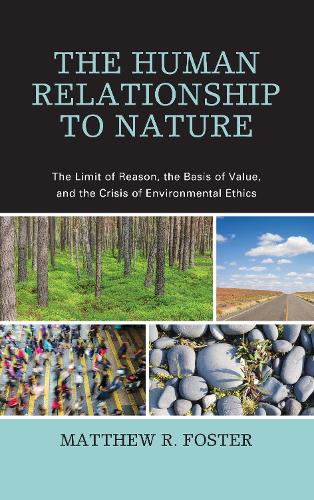
The Human Relationship to Nature: The Limit of Reason, the Basis of Value, and the Crisis of Environmental Ethics
(Hardback)
Publishing Details
The Human Relationship to Nature: The Limit of Reason, the Basis of Value, and the Crisis of Environmental Ethics
By (Author) Matthew R. Foster
Bloomsbury Publishing PLC
Lexington Books
2nd November 2016
United States
Classifications
Professional and Scholarly
Non Fiction
Social and political philosophy
170
Physical Properties
Hardback
490
Width 158mm, Height 238mm, Spine 33mm
794g
Description
Growing alarm over the harm done by humans to the natural world, and even to the viability of our own industrial civilization, compels us to ask the deeper moral question: What should be the human relationship to nature Matthew R. Foster starts by assessing three contrasting patterns of moral reasoning: the Progress Ethic that created the world we live in; the biblically-inspired Stewardship Ethic; and the Connection Ethic based on scientific understanding of the interdependence of all natural entities. Critical analysis reveals that none of these ethics is able to sustain the values it advocates due to two unsupportable presumptionsthat the norms of human morality are commensurate with the natural world, and that the value of an entity is an intrinsic property. Foster argues that in order for a future environmental ethic to be both logically coherent and environmentally constructive, it must start from unconventional notions. First, because nature will never be commensurate with human moral reasoning, non-rational resources must be employed despite the risks involved. Second, value resides in the relationship of one entity to another, and does not belong intrinsically to eitherin short, value is foremost a verb, rather than a noun. Foster proposes a new paradigm attentive to the realm of value relations among all natural entities, one which offers mediating opportunities between nature and morality. In this new ethic there are no shoulds. Rather, moral responsibilities to the natural entities around us are elective, placing us in an unfamiliar yet potentially liberating network of relationships. This book will be of interest to scholarsboth instructors and studentsof environmental ethics, philosophy, religion, and intellectual history, and all who are concerned about the environmental challenges of our time.
Reviews
The human impact on the natural world is ubiquitous and hugely destructive. This has negative consequences for humans but should we be additionally troubled because intrinsic value in nature is thereby destroyed This book argues that conventional environmental ethics cannot sustain the view that there is intrinsic value in nature because there is a fundamental incommensurability between nature and moral reasoning. What makes this book particularly interesting is its deployment of reasoning to underpin a new approach to environmental ethics in which moral agents freely choose their environmental responsibilities. Moreover, so the argument goes, a correct understanding of the place of humans in nature. and the relationship between culture and nature, will incline moral agents to choose principles and actions consonant with conventional environmental ethics. This is a compelling idea. Is it defensible It is definitely worth reading this book to find out. -- Robert Elliot, University of Sunshine Coast
This is a philosophical tour de force, creative enough to deserve careful study by specialists, yet clear enough to be followed by undergraduates. Written with clarity, grace and exquisite reasonableness, it provides a subtle, non-coercive account of our responsibility to nature. -- Jerry L. Martin, University of Colorado at Boulder
Author Bio
Matthew R. Foster is professor of theology and religious studies at Molloy College.
